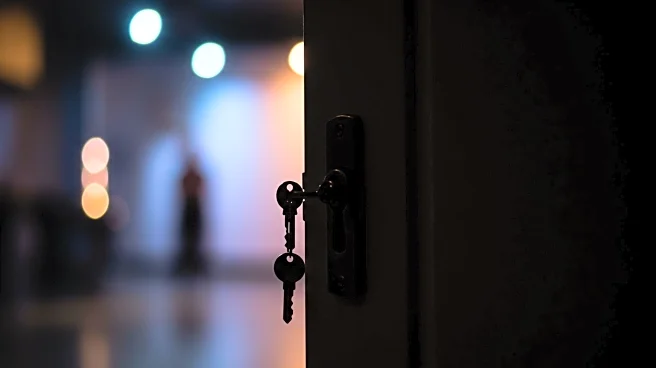What's Happening?
Rylie Jeffries, a contestant on the current season of 'Big Brother,' has been evicted from the house following a closely contested 5 to 4 vote. Jeffries has been a controversial figure this season, facing criticism for his behavior towards fellow contestant Katherine Woodman. Viewers have labeled his actions as 'controlling' and 'scary,' leading to widespread calls for his removal from the show. During the eviction episode, Jeffries, along with Mickey Lee and Morgan Pope, was nominated for eviction. Mickey Lee secured safety by winning the 'BB Block Buster' competition, leaving Jeffries and Pope vulnerable. Ultimately, Jeffries was voted out, much to the delight of the show's fanbase. His mother, Michelle Jeffries, defended him, stating that the environment in the house is misunderstood and that her son is not the person he is being portrayed as.
Why It's Important?
The eviction of Rylie Jeffries highlights the impact of public opinion and social media on reality television. Viewer engagement and feedback have become significant factors in the progression of reality TV shows, influencing both the narrative and the outcomes. This incident underscores the power of audience perception in shaping the careers and reputations of reality TV participants. For the producers, maintaining viewer interest and addressing public concerns are crucial for the show's success. The situation also raises questions about the ethical responsibilities of reality TV in portraying contestants and managing their public image.
What's Next?
As Rylie Jeffries exits the 'Big Brother' house, he will face the reality of the public's perception of his behavior. The backlash on social media is expected to be a significant challenge for him as he re-enters the real world. The show's producers may also need to address the controversy and consider how they handle similar situations in future seasons. For Jeffries, this could be an opportunity to address the criticisms and potentially reshape his public image.
Beyond the Headlines
The eviction of Rylie Jeffries from 'Big Brother' brings to light the broader cultural implications of reality TV. The genre often blurs the line between entertainment and real-life consequences, affecting the personal lives of participants. This event may prompt discussions about the psychological impact of reality TV on contestants and the ethical considerations of broadcasting personal conflicts for entertainment purposes.









